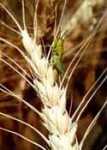Hoppers happen

LINCOLN -- The best approach to keep grasshoppers at bay this summer is to spray early, a University of Nebraska entomologist said.
Grasshopper infestations will continue to worsen across Nebraska unless the insects are controlled while they are small and concentrated in their hatching beds, said Gary Hein, NU entomologist at the Panhandle Research and Extension Center in Scottsbluff.
Spring grasshoppers have already damaged thousands of grassland acres in Custer and Dawson counties and summer species could damage thousands more along with corn, soybeans and other cash crops unless these fields are protected. Damage will be most severe in grassland and no-till crop fields where grasshoppers hatch, but due to drought the infestations are likely to spread as grasshoppers look for greener pastures, Hein said.
"In years when there is (ample) grass, producers don't worry about grasshoppers, but in dry years there's not a lot of grass to go around," he said. "By late July some producers could find grasshoppers leaving ditch banks and outlying fields for their crops." The solution for all producers is to spray infested grassy areas as soon as possible while the grasshoppers are still maturing, the Institute of Agriculture and Natural Resources specialist said.
Once the insects reach the adult stage, usually in early to mid-July, they are difficult to control in crops and virtually impossible to control on rangeland using approved insecticides. Hein said producers need to watch carefully for populations of small grasshoppers on or near their fields and eliminate them before they mature. "Growers don't watch closely enough early enough," he said. "Growers need to make decisions before they get into a crisis situation."
There are numerous effective insecticides available for grasshopper control on rangeland and on various crops. For more information on which insecticide to use, consult NU Cooperative Extension NebFacts, NF97-329, A Guide to Grasshopper Control on Rangeland, and NF02-328, A Guide to Grasshopper Control in Cropland, available at local extension offices and on the Web.
For more information on spraying and grasshopper management, call Hein at (308)632-1369 or Jack Campbell, NU entomologist, at (308)532-3611.
